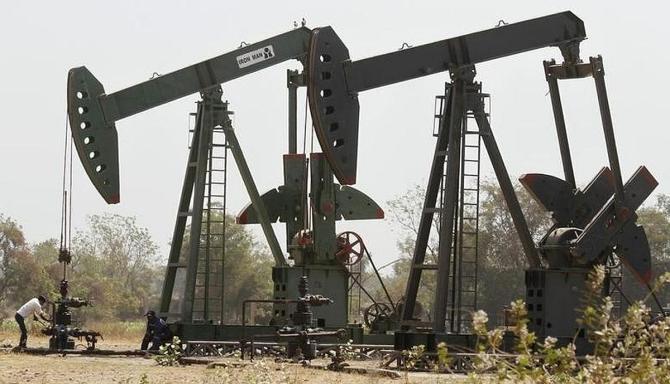India’s unabated tryst with Russian crude oil is slowly coming to an end.

The time has come for Indian refiners to navigate, creatively, the choppy waters of the post-honeymoon period, and for Indian policymakers to take cognisance of the broader impact on India from the spillover of the Russian crisis — after Washington's warning to transgressors last week.
Shipments from Russia to India have averaged over 1.8 million barrels a day since February, according to data from Paris-based market analytics firm Kpler. But much of the crude shipped to India was non-sanctioned because it traded below a price cap set by the US led G-7 nations in December.
Shipping, insurance and payments were less of an issue.
The $60 a barrel cap has now been breached for Urals, a medium, sour grade that accounts for a majority of Russian oil shipments, rendering India’s entire supplies vulnerable.
Given the 45-60 days’ time period taken to contract and deliver Russian oil, the real impact from the breach will be visible from June.
New Delhi faces issues at both the micro and macro levels.
The first relates to the physical part of transporting the oil; the second involves energy security, expanding the rupee’s reach, and managing relations with Western powers.
The nitty-gritty of buying 2 million barrels of oil every day is posing increasing difficulties.
Foreign Minister Subrahmanyam Jaishankar said in a speech last week at a Russian industry event that the bilateral oil trade presents issues over payments, logistics and certification.
The latest flashpoint is an increasing oversight of the G-7 mandated price cap. In December, the US-led G7 had barred exports of Russian oil priced over $60 a barrel at the loading point.
But lax enforcement by the US and EU resulted in several trades taking place above the cap, industry officials said, with China and India enjoying the spillovers.
Now, the US Office of Foreign Assets Control (OFAC), for the first time, warned last week of a possible evasion of the price cap on crude oil originating from the Russian Federation.
OFAC said transporters and financial institutions must retain records and attestations by oil market players that Russian oil was bought below the cap to avoid penalties.
It also called for itemisation of the oil cost because shipping, freight, and insurance costs are not included in the price caps — but a failure to itemise such costs can be used to hide purchases of Russian oil above the cap.
Issues have also crept up over paying in dirhams into Russian bank accounts in Dubai, a payment mode for Indian refiners this year.
This newspaper said in an article last week that UAE officials have told Indian counterparts that their banks or currency cannot be used to pay for Russian oil priced over the cap.
Washington and London have intensified pressure on the emirate, prompting officials to scrutinise operations of Russian companies and banks based out of Dubai, and refuse licences in some cases.
Local banks are equally concerned by Washington’s warning even though Indian institutions are not sanctioned.
The breakup of Russian crude costs required in the invoices may need to be attested or certified to process payments though it’s unclear which entity should certify these invoices, a banking official said.
State Bank of India, Punjab National Bank and Bank of Baroda are among those fearing reprisals from Washington, banking officials said.
But what has queered the pitch for Indians is that caution applies to Urals grades also, which now trade above the cap. Such trades complicate logistics.
Nearly 60 per cent of the Russian oil trade is still carried on Western tankers as Urals, Russia’s biggest export grade, until last month, traded well below the cap.
Non-availability of Western carriers poses serious problems for deliveries to India.
Mumbai-based Gatik Ship Management, a significant shipper of Russian oil to India since Moscow’s invasion of Ukraine, has lost protection and indemnity insurance from the American Club, which belongs to the International Group of P&I Clubs that insures most of the global tanker fleet, Energy Intelligence reported.
Gatik deploys over 40 tankers, and its exit from the insurance body coincided with Urals trading above the cap.
Transporters cannot afford to ship oil without insurance.
China and India lift 80-90 per cent of Russia’s seaborne crude.
But China has pulled off its purchases on the back of its heft as the world’s biggest user of oil and a manufacturing powerhouse.
That is coupled with its long experience in silently buying sanctioned oil.
In March, China bought a combined 2 million barrels a day of oil from Iran and Venezuela via Malaysia and Oman, Energy Intelligence said in a separate report.
India refrains from such stealth trades.
By expanding its basket of discounted, sanctioned oil trades China is less dependent on Russian crudes compared to India.
Russian oil accounted for around 18 per cent of China’s total imports and 13 per cent of its consumption this year.
By contrast, Russian oil meets 44 per cent of our domestic fuel needs, a level of dependence that India has not placed earlier on any of its traditional Gulf suppliers, let alone on a nation whose future depends on the actions of US and the EU.
China has also leveraged Russia’s sanctioned status to expand trade in yuan, enabling Chinese banks to process payments for Russian oil without fear of US sanctions, which India is unable to do.
Successful internationalisation of a currency, even in a limited way, has to do with the value central banks place in holding a currency as reserve.
Last year, Chinese exports to Russia were around $76 billion or 40 per cent of the $190-billion bilateral trade.
Indo-Russian trade totals around $35 billion, with India’s exports less than 10 per cent of the total trade.
Such a yawning gap trade deficit has prompted Moscow to demand dollars or dirhams as payment for oil supplies instead of a rupee arrangement, industry officials said.
Finance Minister Nirmala Sitharaman, in an interview to Bloomberg in Washington, has called for “constantly refiguring” strategies to continue buying discounted Russian oil as affordability of crude was key for India.
But the question is in the process of creatively sourcing Russian crude, for how long can New Delhi keep Washington at bay and deal with increasing policing by Western powers.
Slippery ground
- The $60 a barrel cap has now been breached for Urals, rendering India’s entire supplies vulnerable
- New Delhi faces issues relating to the physical part of transporting the oil, and over energy security
- The latest flashpoint is an increasing oversight of the G-7-mandated price cap
- Issues have also crept up over paying in dirhams, a popular payment mode for Indian refiners
- Local banks are equally concerned by Washington’s warning even though Indian institutions are not sanctioned
- Mumbai-based Gatik Ship Management, a significant shipper of Russian oil to India since Moscow’s invasion of Ukraine, has lost protection and indemnity insurance from the American Club
- By expanding its basket of discounted, sanctioned oil trades China is less dependent on Russian crudes compared to India











